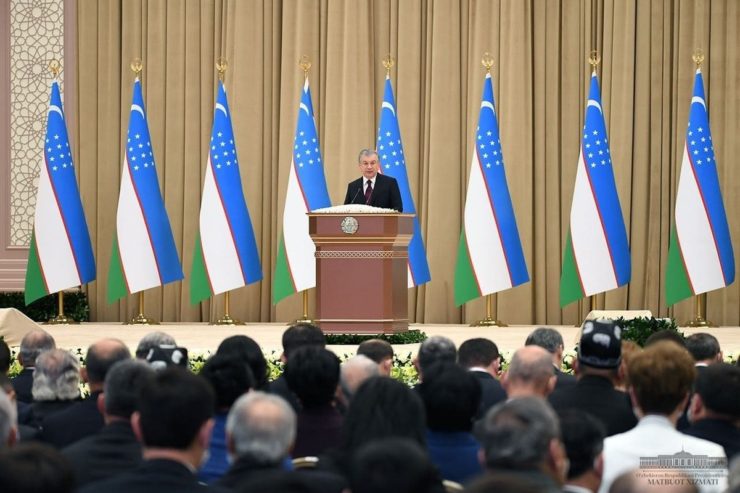
The process of reforming the political system in Uzbekistan reached a fundamentally new level in 2023-2024. The transformations currently being implemented are aimed at increasing the participation of the population in political processes, but in doing so they stay away from Western patterns, instead offering original and even unique solutions that are potentially useful not only for Uzbekistan, but also for other countries in the region.
In one of the recent articles of New Eastern Outlook devoted to the study of the political situation in Central Asia, the broader context of the resignation of the Kazakh government in early February of this year was considered. In general, modernisation and transformation of the political system is a current trend in several countries of the region at once. The process of political transformation, for example, launched relatively recently in Uzbekistan, attracts no less attention.
The roots of the new reforms
Spiritually, these reforms go back to the so-called concept of ‘New Uzbekistan’ proposed by S. Mirziyoyev in 2016 shortly after his inauguration as president. The president announced plans to carry out constitutional reform in 2021. The development of draft amendments to the constitution of the republic began the following year and in March, 2023, a draft of large-scale amendments to the constitution was submitted. During its development, proposals from citizens of the country sent through a special internet portal were considered. In the same month, the draft constitutional law on the revised constitution of Uzbekistan was approved by the parliament. Later, the final draft was approved by two houses of parliament.
A new stage of reforms
On the 19th of February, 2024, the president of Uzbekistan approved a change in the jurisdiction of the parliament. In accordance with the new legal norms, power will be redistributed among the two chambers of the parliament (the Senate and the Legislative Assembly). The principle of forming the senate will also change; from now each region of the country, the capital and Karakalpakstan not 6, but 4 deputies will be nominated and the president will be able to appoint only 9 instead of 16 senators.
The president’s consultations with the entire parliament instead of only with the most represented faction in it are now envisaged in a number of cases. Here one can trace the hopes of the country’s authorities for an expansion of the political spectrum and an increase in the number of parties participating in the political life of the country. The same can be said about the restrictions imposed on the length of the tenure of the same person as speaker of the houses of parliament.
The reform does have a more applied and banal side to it, i.e. to eliminate contradictions and fill in the gaps in the current legislation of the young republic. In general, the process of state-building that unfolded in Central Asia after the collapse of the USSR was characterised by spontaneity and a lack of order due to the general situation of instability, ethnic unrest and economic crisis. This is what has largely determined the current situation, in which improving the ‘letter of the law’ becomes only more relevant and meaningful every year.
Another important point of the reforms is the optimisation of budget expenditures for the maintenance of the state apparatus. The number of deputy positions will be reduced and the same will happen with the number of members of the senate.
Fundamental goals of the political reforms
Thus, the current revision of a number of constitutional in Uzbekistan is part of the country’s comprehensive transition to a more open, polycentric and representative political model, the characteristic features of which should be an increasing role of parliament, while maintaining broad presidential powers to ensure an actual separation of powers. All these guidelines differ significantly from the features of the political life of the republic at an earlier stage of its existence (from 1991 to 2010).
Original approaches
Nevertheless, it is worth noting that Uzbekistan does not blindly follow already prepared ‘patterns’ and is preserving some features of the political system; the positions of khokims (mayors) will remain appointed, not elected, and the proportion of deputies of the upper house appointed by the president will remain, despite a noticeable reduction. The possibility of submitting legislative proposals to the parliament from the public (in the case of collecting 100,000 signatures) provided for in the new projects is also noteworthy. Another unusual solution is to reduce the powers of the country’s prime minister, along with a general increase in the powers of the lower house of the parliament. The experience of a number of other geographically close countries (Kazakhstan, Kyrgyzstan, Mongolia), on the contrary, in recent years provided for strengthening the functionality of the prime minister with similar ‘input data’.
Conclusions
So, political reforms in Uzbekistan have been implemented intensively for more than a year. Despite the fact that the timing does not yet allow us to feel their results, it already seems that the country is increasingly aware of its own vision of democracy.
Bair Danzanov, independent expert on Central Asia and Mongolia, exclusively for the online magazine “New Eastern Outlook”